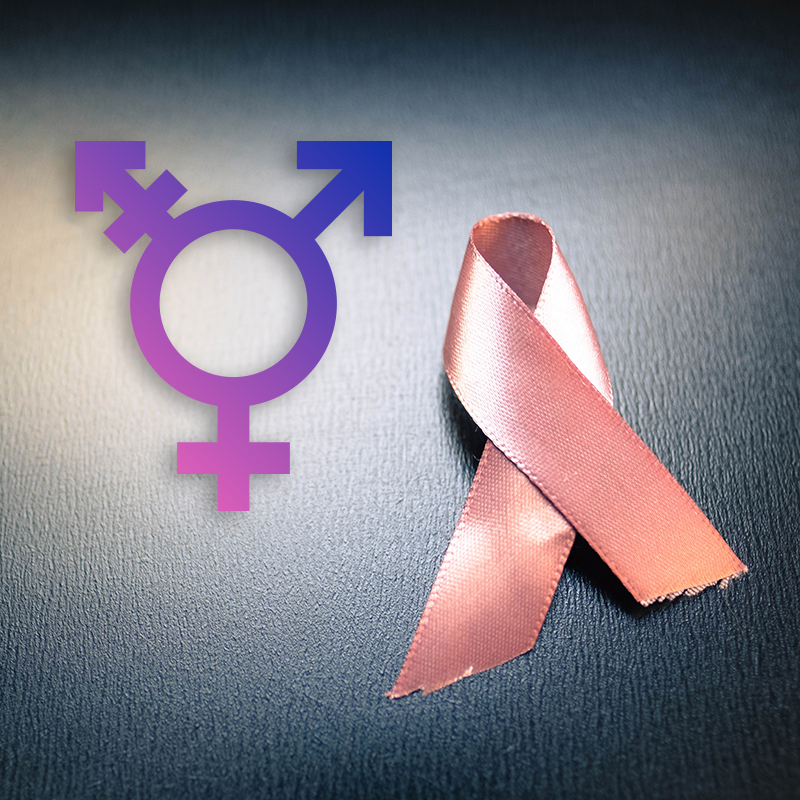
[This article is part of our Transgender Breast Health Series.]
Breast cancer risk factors are heavily influenced by sex assigned at birth and hormoneA chemical substance produced in the body that controls and regulates the activity of certain cells or organs. levels. So it’s no wonder that one of the top questions we get in our breast health programs is, what about transgender men and women? How do breast cancer risk factorsAnything that increases or decreases a person’s chance of developing a disease. and early detection methods change for the transgender community?
There are a variety of sex reassignment surgeries (SRS), also called gender confirmation surgeries (GCS), that transgender men and women choose to undergo as part of their transition. Three such procedures are: mastectomies, oophorectomies, and breast implantsA saline or silicone filled sac used during plastic surgery to enlarge or restore the shape of the breast..
Mastectomies & Top Surgery
A bilateralOn both sides. mastectomyAn operation removing all or part of the breast. is the removal of both breasts. Mastectomies, when performed to prevent or treat breast cancer, remove as much of the breast tissue as possible. Transgender men often opt for a modified form of a mastectomy called “top surgery” where a small amount of breast tissue is left behind to be shaped into a male chest.
Because breast tissue that might be prone to breast cancer is being removed, both mastectomies and the more abbreviated top surgery, to a lesser degree, reduce breast cancer risk (SOURCE). Breast tissue is still breast tissue though. Non-transgender men can get breast cancer and there have been cases of transgender men who have received top surgery that have still been diagnosed with breast cancer (SOURCE).
Oophorectomy
A bilateral oophorectomy is a surgery that removes both the ovariesThe female reproductive organs in which ova or eggs and hormones are produced.. Some FTMs (female to male transgender people) opt for this sex reassignment surgery in combination with a hysterectomy (removal of the uterus) to reduce feelings of discomfort with their body (“gender dysphoria”). It is also often done to treat conditions and cancer of the ovaries and to reduce risk for ovarian and breast cancer for those at elevated risk.
The ovaries are the main source of estrogen, so removing them provides a reduction in estrogenA female sex hormone that is primarily produced by the ovaries. Its primary function is to regulate the menstrual cycle and assist in the production of secondary sex characteristics such as breasts. It may even play a role in the production of cancer cells in the breast tissue. and thus a decreased risk of breast cancer.
Breast Implants & MTF Breast Augmentation
For MTF (male-to-female) transgender women, breast augmentation or implants are common. While breast implants do not cause or increase the risk for breast cancer, a 2013 meta-study in the British Medical Journal found that implants can increase the risk of being diagnosed at a later stage, which leads to lower survival rates. The study suggests that implants could make early detection methods like mammograms more difficult and lead to delayed diagnosis.
And while few cases have been reported, breast implants have also been linked to a rare form of lymphoma called breast implant-associated anaplastic large cell lymphoma (BIA‑ALCL). Most cases of BIA-ALCL have been in women with textured implants, and good news is that implants nowadays are typically smooth.
Breast Cancer Early Detection
Regardless of your gender identity, one of the easiest and most important ways to detect breast cancer is by doing a monthly breast self-exam (BSE). Anyone can feel a lump and anyone can get breast cancer. If you’ve undergone hormone therapy or surgery, a breast self-exam is a key way of understanding your body’s new “normal” and it will help you speak confidently with your doctor about any changes you detect. If you have questions about how to do a BSE, your doctor can show you how to do your own exam when they do your clinical breast exam.
If you are over 40, mammogramsA low dose x-ray picture of the breast that allows a doctor to view glandular tissue and determine the presence of cancer. are another important line of defense against breast cancer. Transgender men who have not had top surgery should receive annual mammograms after the age of 40. If you are a transgender woman, and have taken hormones or have other breast cancer risk factors, you should also start annual mammograms after the age of 40. Since breast implants can make breast imaging more difficult, make sure your mammography provider is aware of your implants and has experience with your specific situation.
Remember, your health is in your hands. You have power over your health and your risk factors for breast cancer. Take charge!